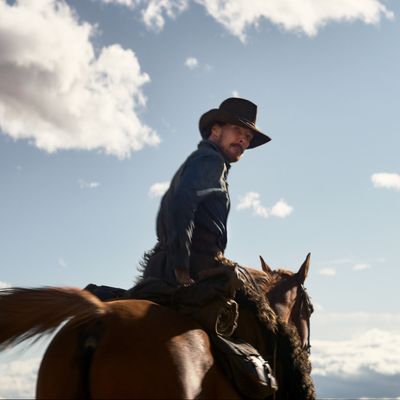
It has been 12 years since Jane Campion released a feature, and we’ve certainly missed her voice on the big screen — missed the compassion with which she draws her twisted dreamers and the overwhelming cinematic wonder of the spaces those characters inhabit. In The Power of the Dog, an adaptation of Thomas Savage’s acclaimed 1967 novel, Campion trains her lens on the American West (1925 Montana, to be exact), and the results are as majestic and unnerving as you’d imagine. If in the past her locations had a lush, sinister beauty — think of those overgrown gardens in The Portrait of a Lady, the muddy and windswept shores of The Piano, the cluttered streets of In the Cut — this time the menace lies in the wide expanses of the American wilderness.
The universe of The Power of the Dog (which just premiered at Venice and will do the rounds of the fall festivals before premiering theatrically in November and on Netflix December 1) is a big but barren one with not a lot of people in it. The story begins with rancher brothers Phil (Benedict Cumberbatch) and George (Jesse Plemons) bringing their herd through the small town of Beech and overnighting at an inn run by overworked widow Rose (Kirsten Dunst) and her son, Peter (Kodi Smit-McPhee), a gawky, sensitive teen devoted to his mother and fond of making delicate paper flowers. (“What kind of man would I be if I didn’t help my mother, if I didn’t save her?” he says in the opening narration, words that will come to haunt the rest of the picture.) The tense, quiet George takes a shine to Rose, while the crude, loud Phil cuts the earnest, awkward Peter down to size, much to the guffawing amusement of his fellow cowboys. Once George and Rose are married, she comes to live with the two brothers on their ranch, and Phil continues to terrorize both mother and son. The ensuing psychological siege isn’t subtle or subdued or symbolic; it’s surprisingly savage. Phil’s cruelty takes your breath away at times.
It’s a perfect role for Cumberbatch, whose gentle features and angular physique have always made him seem assembled from competing impulses. We think we know who Phil is at first: rough, judgmental, sadistic, an absolute villain. But Campion doesn’t do absolute villains, and there’s a twitchy neediness to Phil too, one the actor summons with almost supernatural precision. Despite being the alpha dog in their relationship, he clings to his younger brother (even as he angrily calls him “fatso”) and clearly knows more about the world than he lets on. Even the way he struts across his own ranch has a performative quality that betrays his inner uncertainty.
Little by little, we realize Phil has embraced the role of a rugged cowboy because of a need to belong to something, having found it years ago in this way of life that may itself be slowly disappearing. (When a snatch of the Charleston plays on a pianola, it feels as if the characters have suddenly been transported into the future — until we remember, Oh right, it’s the Roaring ’20s.) Smit-McPhee, by contrast, portrays Peter as someone who can’t be anything but himself, even if that infuriates the men around him. He seems incapable of putting on airs or trying on identities and postures. Peter is who he is, and Phil sees that as a direct threat to who he wants to be.
Campion preserves the simplicity of Savage’s prose with the understated ease of her own storytelling, and she even finds a compelling way to navigate the novel’s somewhat outdated dime-store Freudian conceits. She has always managed to enter her protagonists’ minds by focusing on the external, on the things they see and touch and the thick air around them. In her work, the environment is a force in itself, both reflecting and fueling the characters’ psychological states. The Power of the Dog was shot in New Zealand, and I can’t speak to how much it resembles rural 1920s Montana but it’s a hell of a setting: sensuous, unreal, foreboding, with hills that weave in and out of one another like ropes, and shadows that form strange, captivating patterns. At one point, not long after they’re married, Rose teaches George to do a few dance steps with her on a hillside. He starts to cry, muttering about “how nice it is not to be alone.” And yet they are alone against this infinite landscape stretching before them. One is reminded of the existential deserts of movies like The Sheltering Sky with their shattering clarity. You can implicitly understand why these people would cling to each other, to their families, to their codes and desires. You can also understand why they might be repulsed by these very same things, and why they might all be doomed in the end.
More Movie Reviews
- The Accountant 2 Can Not Be Taken Seriously
- Another Simple Favor Is So Fun, Until It Gets So Dumb
- Errol Morris Has Been Sucked Into the Gaping Maw of True Crime


